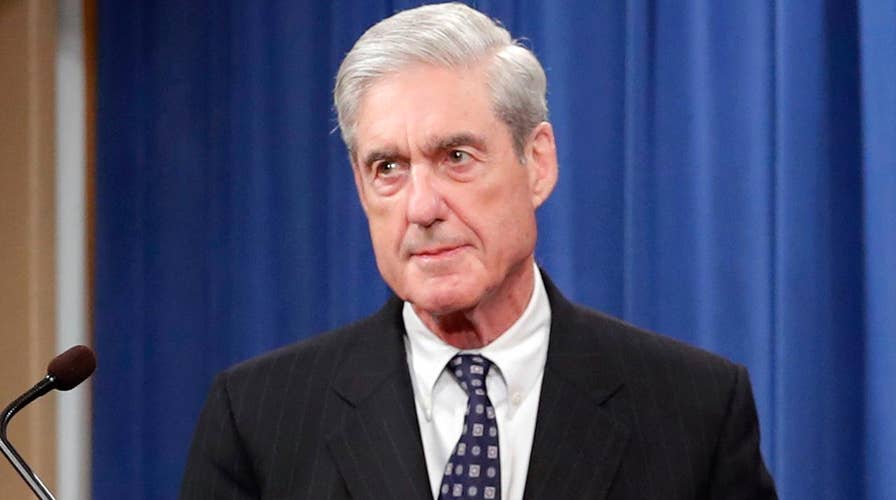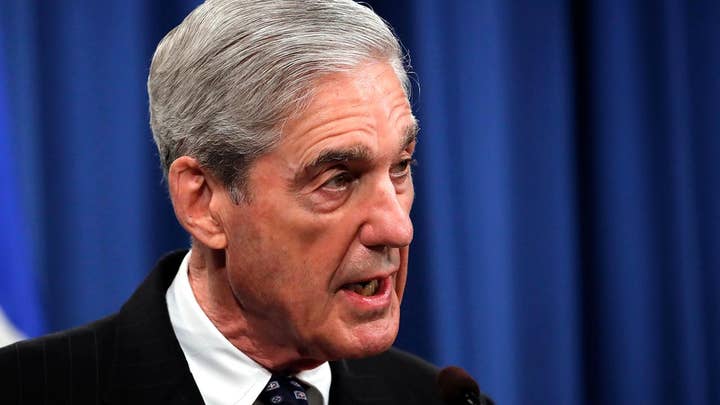Robert Mueller: Charging the president with a crime was not an option we could consider
Speaking publicly for first time since the release of Russia report, special counsel Robert Mueller says there were 'multiple, systematic efforts' to interfere with the presidential election, that his team found insufficient evidence to charge a broader conspiracy, and that if there was confidence that the president did not commit a crime, the report would have said so.
Special Counsel Robert Mueller has peddled two different stories. Only one can be true.
In his final act before resigning his position, Mueller told the gathered media on Wednesday that his non-decision decision on whether the president obstructed justice was “informed” by a long-standing opinion by the Office of Legal Counsel (OLC) at the Justice Department that a sitting president cannot be charged with a crime. But according to William Barr, that’s not what Mueller told the attorney general and others during a meeting on March 5, 2017. Here’s what Barr told Senators during his May 1st testimony:
“We were frankly surprised that they were not going to reach a decision on obstruction and we asked them a lot about the reasoning behind this. Mueller stated three times to us in that meeting, in response to our questioning, that he emphatically was not saying that but for the OLC opinion he would have found obstruction.”
Barr said there were others in the meeting who heard Mueller say the same thing – that the OLC opinion played no role in the special counsel’s decision-making or lack thereof. The attorney general repeated this in his news conference the day Mueller’s report was released to the public:
“We specifically asked him about the OLC opinion and whether or not he was taking a position that he would have found a crime but for the existence of the OLC opinion. And he made it very clear several times that was not his position.”
Yet, on Wednesday Mueller was telling a different tale. He seemed to argue that he could not have accused the president of obstruction because he was handcuffed by the OLC opinion. Why, then, did Mueller allegedly inform Barr that a special counsel can abandon the opinion if the facts merit it?
“He (Mueller) said that in the future the facts of a case against a president might be such that a special counsel would recommend abandoning the OLC opinion, but this is not such a case.”
Mueller did not abandon the OLC opinion in this case because he surely knew the facts and evidence did not support the law of obstruction. Instead, in his 448-page report, he implied presidential obstruction in a remarkable achievement in creative writing.
He set forth in luxurious detail “evidence on both sides of the question.” But this is not the job of any chief prosecutor, anywhere.
Mueller was not retained to compose a masterpiece worthy of Proust. He was hired to investigate potential crimes arising from Russian interference in a presidential election and make a reasoned decision on whether charges were merited.
Mueller’s actions were not only noxious but patently unfair to Trump. The special counsel publicly besmirched the president with tales of suspicious behavior instead of stated evidence that rose to the level of criminality.
Mueller’s actions were not only noxious, but patently unfair to Trump. The special counsel publicly besmirched the president with tales of suspicious behavior instead of stated evidence that rose to the level of criminality.
This is what prosecutors are never permitted to do. Justice Department rules forbid its lawyers from annunciating negative narratives about any person, absent an indictment.
How can that person properly defend himself without trial? This is why prosecutors like Mueller are prohibited from trying their cases in the court of public opinion.
If they have probable cause to levy charges, they should do so. If not, they must refrain from openly disparaging someone that our justice system presumes is innocent.
In this regard, Mueller shrewdly and improperly turned the law on its head. Consider the most inflammatory statement that he leveled at the president in his report. It was guaranteed to ignite the impeachment fire:
“While this report does not conclude that the President committed a crime, it also does not exonerate him.”
To reinforce the point, Mueller stated it twice in his report. He then reiterated the argument on Wednesday when he said: “if we had confidence that the president clearly did not commit a crime, we would have said so.”
Prosecutors are not, and have never been, in the business of exonerating people. That’s not their job.
An experienced federal prosecutor, Mueller certainly knew this. It appears he had no intention of treating Trump equitably or applying the law in conformance with our criminal justice system.
In a singular sentence, Mueller managed to reverse the legal duty that prosecutors have rigidly followed in America for centuries. Their legal obligation is not to exonerate someone or prove an individual’s innocence. Nor is any accused person required to prove his or her own innocence.
Everyone is entitled to the presumption of innocence. It is the bedrock on which justice is built.
Prosecutors must prove guilt beyond a reasonable doubt. To bring charges they must have, at minimum, probable cause to believe that a crime was committed.
The special counsel took this inviolate principle and cleverly inverted it. He argued that he could not prove the president did not commit a crime.
Think about what that rationale really means. It is a double negative. Mueller was contending that he can’t prove something didn’t happen.
What if this were the standard for all criminal investigations? Apply it to yourself.
Let’s say you deposited your paycheck at the bank on Monday, the same day it’s robbed. A prosecutor then announces publicly that he cannot prove you didn’t rob the bank, so you are neither criminally accused nor “exonerated.”
The burden of proof has now been shifted to you to disprove the negative. How would you feel? You’ve been maligned with the taint of criminality and no longer enjoy the presumption of innocence.
This is the equivalent of what Mueller did to Trump. The special counsel created the impression that Trump might have engaged in wrongdoing because he could not prove otherwise.
The consequential injustice and harm that inevitably follows is what happens when we reverse the burden of proof and abandon the innocence standard that are revered in a democracy as fundamental rights.
Yet, this is what Mueller did. He improvised a new standard that applies only to Trump --presumption of guilt. Under this novel “guilty until proven innocent” paradigm, it is up to the president to prove the allegations are false.
Attorney General Barr recognized that Mueller had mangled the legal process, describing his statement as “actually a very strange statement.”
Barr told Congress that he was forced to correct Mueller’s mistake. “I used the proper standard,” said Barr. “We are not in the business of proving someone did not violate the law –I found that whole passage very bizarre,” he added.
Our system of justice in America is designed to protect the innocent. This is why there are laws that prevent disclosure of grand jury testimony and even more expansive rules at the Justice Department that prohibit prosecutors from disclosing derogatory information about uncharged individuals. It is, in a word, unfair to smear people who have not been charged with anything.
Mueller was well aware of this. In the “introduction” to Volume II on obstruction, he recited the duty of prosecutors to be fair by refraining from comment. In the case of a sitting president, wrote Mueller, “The stigma and opprobrium could imperil the President’s ability to govern.”
Ironically, the special counsel then proceeded to ignore his own warning. He produced his own “dossier” on Trump that was filled with suspicions of wrongdoing.
CLICK HERE TO GET THE FOX NEWS APP
He refused to make a decision to charge the president in a court of law but was more than willing to indict him in the court of public opinion.
His report was a non-indictment indictment. It was calumny masquerading as a report.
Parts of this column are adapted from the author's forthcoming book "Witch Hunt: The Plot to Destroy Trump and Undo His Election (Broadside Books, October 1, 2019)."










































